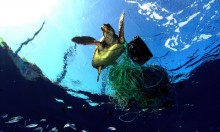Hírek a nagyvilágból
 >
>
Great Boost for Conservation of Grassland Birds and Flyways in the Americas

Male Bobolink © Andrea Westmoreland from DeLand, United States (Bobolink at Lake Woodruff) [CC BY-SA 2.0 (https://creativecommons.org/licenses/by-sa/2.0)], via Wikimedia Commons
The Second Meeting of Signatories (MOS2) of the Memorandum of Understanding (MOU) on the Conservation of Southern South American Migratory Grassland Bird Species and their Habitats took place from 24 to 25 July 2018 in the city of Florianópolis, at the kind invitation of the Government of Brazil. The MOU’s Action Plan was updated until the year 2023 and specific objectives were developed for the protection and sustainable management of grasslands which are of importance to migratory birds and the ecosystem services they provide.
2018 bird photographer of the year – in pictures
2018/009: Third Meeting of the Technical Advisory Group to the Raptors MOU
The Coordinating Unit of the Memorandum of Understanding on the Conservation of Migratory Birds of Prey in Africa and Eurasia (Raptors MOU) is pleased to announce that that the Third Meeting of the
2018/008: Enhancing the Relationship between CMS and Civil Society
The UNEP/CMS Secretariat would like to draw Parties’ attention to CMS Resolution 11.10 (Rev.COP12
Mediterranean Cetaceans: First Results of Synoptic Survey Sightings
The preliminary results of the transects already covered under the ACCOBANS Survey Initiative (ASI) are now available on the ACCOBAMS website. ACCOBAMS launched ASI in June to improve the understanding of the conservation status of cetaceans at the Mediterranean/Black Sea macroregional level and work is still going on in the eastern Mediterranean.
CMS Action Against Wildlife Crime Presented at IUCN Technical Meeting
From 12 to 13 July 2018, CMS attended the Technical Meeting of Experts regarding the IUCN World Conservation Congress (WCC) Resolution 70 on “Crimes against the Environment”, hosted by the IUCN Environmental Law Centre in Bonn, Germany. Participants from ten international organizations, including UN agencies, IGOs and NGOs met and shared their experiences in response to crimes against the environment and wildlife. CMS showcased its work on the issues of wildlife crime affecting avian, terrestrial and aquatic species and discussed with the international experts on legislation, enforcement and compliance in illicit wildlife trade and conservation of those species.
Side Event on Solutions to Bycatch and Entanglement in Ghost Gear held at FAO COFI33
On 12 July, during the 33rd Session of the FAO Committee on Fisheries (COFI33), held in Rome, management solutions for ghost gear, also known as abandoned, lost, or otherwise discarded fishing gear (ALDFG), and bycatch were discussed in a side event. FAO Member States Vanuatu, Samoa, Fiji, Palau, Belgium, the Netherlands, New Zealand, and Panama served as hosts for the event organized in collaboration with FAO, the International Whaling Commission (IWC), World Animal Protection, WWF and CMS.
2018/007: 1st Meeting of Range States for the Joint CMS-CITES African Carnivores Initiative
The CMS Secretariat would like to inform all Parties that the 1st Meeting of Range States for the Joint CMS-CITES African Carnivores Initiative will take place 5 - 8 November 2018 in Bon
2018/006: 48th Meeting of the CMS Standing Committee and Associated Events
The 48th Meeting of the CMS Standing Committee will take place from Tuesday, 23 to Wednesday, 24 October 2018 at the UNEP/CMS Secretariat premises, Platz der Vereinten Nationen 1, 53113 Bonn.
CMS Marine Noise Assessment Guidelines Promoted at the UN in New York
From 18 to 22 June 2018, government representatives and experts gathered at the Headquarters of the United Nations to discuss the issue of anthropogenic underwater noise in the context of the UN consultative process on Oceans and the Law of the Sea (ICP-19). CMS Executive Secretary, Bradnee Chambers, delivered an opening statement and brought the CMS Family Guidelines on Environmental Impact Assessments for Marine Noise-generating Activities to the attention of UN Member States.




